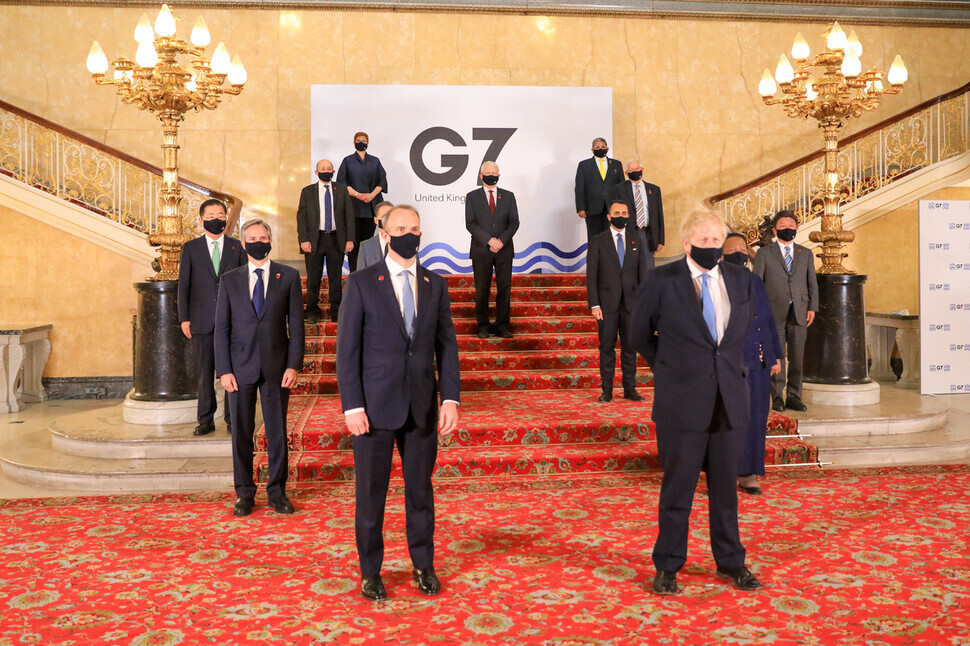hankyoreh
Links to other country sites 다른 나라 사이트 링크
S. Korean foreign minister asks for cooperation on Korean Peninsula peace process at G7 meeting

South Korean Minister of Foreign Affairs Chung Eui-yong issued a call at a G7 Foreign and Development Ministers’ meeting for support and cooperation on the Korean Peninsula peace process, which faces a crossroads as the US formulates its new North Korea policy.
At the meeting in London on Tuesday and Wednesday, Chung called for the G7’s support and cooperation on the “Korean Peninsula peace process for the denuclearization of the Korean Peninsula,” which he called a “key issue for the peace and prosperity of the Indo-Pacific region,” the South Korean Ministry of Foreign Affairs (MOFA) said Thursday.
With Chung’s remarks, the South Korean government took advantage of the US government’s conclusion of its North Korea policy role and its explanation of the results to South Korea and to Japan and other G7 countries to reiterate the importance of resuming the currently halted Korean Peninsula peace process.
Chung also reportedly held serious discussions on the Korean Peninsula situation not only in bilateral and trilateral foreign minister meetings with the US and Japan but also in meetings with the foreign ministers of Germany, the EU and Canada.
Issues related to North Korea and its nuclear program were broached once again as a major topic on the international stage, with a Monday welcoming dinner focusing on the Iran and North Korea issues at the G7 level.
But the key question at present is how positively Pyongyang will respond.
Based on the messages to South Korea and the US shared by North Korea through its major media on Sunday and the lack of clear incentives in the new US policies on North Korea that have been announced to date, some analysts are suggesting that North Korea is “not likely” to respond positively.
The South Korean government, for its part, is adopting a wait-and-see approach.
“The US has said that its emphasis is on diplomatic engagement, including its adjusted pragmatic approach based on the Singapore Joint Statement, and it has also announced plans to explain its new policies directly to North Korea, so we think North Korea may at least want to hear them out,” a South Korean government source familiar with Korean Peninsula issues said.
Meeting with reporters the same day, a Ministry of Unification official said, “We need to watch developments rather than jumping to conclusions about North Korea’s attitude.”
The MOFA also reported that Chung had “emphasized the need for cooperation to protect the oceanic environment in the Indo-Pacific region.” While he did not mention Japan or Fukushima directly, his remarks appear to have been directed at the Japanese government’s decision to discharge contaminated water from the Fukushima Nuclear Power Plant into the ocean.
The major issues on the agenda for the G7 expanded meeting on Wednesday, which also included invited countries, consisted of sharing and cooperation in connection with Indo-Pacific regional policies, sharing and cooperation on values related to open societies, international cooperation on COVID-19 vaccines, and support on the areas of climate change, female children and developing countries.
Accordingly, Chung also explained the vision and results of the South Korean government’s “New Southern Policy Plus,” a policy approach for cooperation in the Indo-Pacific region. He expressed Seoul’s willingness to contribute to areas such as climate change and public health.
According to the MOFA, Chung also shared about the South Korean government’s experiences with controlling the COVID-19 pandemic, emphasizing the urgency of international cooperation to ensure fair access to vaccines and calling on the G7 countries to demonstrate leadership on the issue.
Established in 1976, the G7 is a consultative organization with the US, UK, Germany, France, Japan, Italy, Canada, and the EU.
Four other countries — South Korea, Australia, India and South Africa — were invited to attend the latest meeting, while Brunei was also represented as ASEAN chair.
By Kim Ji-eun, staff reporter
Please direct comments or questions to [english@hani.co.kr]

Editorial・opinion
![[Editorial] Penalties for airing allegations against Korea’s first lady endanger free press [Editorial] Penalties for airing allegations against Korea’s first lady endanger free press](https://flexible.img.hani.co.kr/flexible/normal/500/300/imgdb/original/2024/0502/1817146398095106.jpg) [Editorial] Penalties for airing allegations against Korea’s first lady endanger free press
[Editorial] Penalties for airing allegations against Korea’s first lady endanger free press![[Editorial] Yoon must halt procurement of SM-3 interceptor missiles [Editorial] Yoon must halt procurement of SM-3 interceptor missiles](https://flexible.img.hani.co.kr/flexible/normal/500/300/imgdb/child/2024/0501/17145495551605_1717145495195344.jpg) [Editorial] Yoon must halt procurement of SM-3 interceptor missiles
[Editorial] Yoon must halt procurement of SM-3 interceptor missiles- [Guest essay] Maybe Korea’s rapid population decline is an opportunity, not a crisis
- [Column] Can Yoon steer diplomacy with Russia, China back on track?
- [Column] Season 2 of special prosecutor probe may be coming to Korea soon
- [Column] Park Geun-hye déjà vu in Yoon Suk-yeol
- [Editorial] New weight of N. Korea’s nuclear threats makes dialogue all the more urgent
- [Guest essay] The real reason Korea’s new right wants to dub Rhee a founding father
- [Column] ‘Choson’: Is it time we start referring to N. Korea in its own terms?
- [Editorial] Japan’s rewriting of history with Korea has gone too far
Most viewed articles
- 160% of young Koreans see no need to have kids after marriage
- 2[Editorial] Penalties for airing allegations against Korea’s first lady endanger free press
- 3Presidential office warns of veto in response to opposition passing special counsel probe act
- 4Hybe-Ador dispute shines light on pervasive issues behind K-pop’s tidy facade
- 5Anti-immigration candidate marauds across Korea with squad detaining foreigners
- 6Months and months of overdue wages are pushing migrant workers in Korea into debt
- 7Alleged drug use by Korean A-listers rocks nation – but not for the first time
- 8[Column] Unsettling moves by the UN Command lay way for Korean involvement in Taiwan
- 9[Reporter’s notebook] In Min’s world, she’s the artist — and NewJeans is her art
- 10Bills for Itaewon crush inquiry, special counsel probe into Marine’s death pass National Assembly